Exploring Children’s Attitudes Towards Notions of Digital Good/Bad through Hybrid Arts Practice
August 2023 - May 2024Funded by ESRC Digital Good Network
with Eleanor Dare, Angus Main, John Potter and Steve Love
This project built on our previous work that taught children about digital sensors, the data they can collect about them and used speculative design to create tools to subvert/block them. This project was broader seeking 9-13-year-old’s attitudes towards notions of digital good/bad and knowledge of how these differed from adults. The project sat within the wider ESRC Digital Good Network and aimed to address their central question of “What should a good digital society look like and how do we get there?”, by focusing specifically on children as currently overlooked users of digital technology and emerging digital citizens.
Understanding children’s ideas/ knowledge is crucial in shaping our collective vision and actions. As theorists we drew upon Kress (2012; 1996), Barad, (2007), Nail (2020) and practices relating to ethical implications of digital, and emerging technologies. Then, to understand children’s ideas we prodced two public networking events to crowd source key ideas to feed into the design of materials for working with children and seeking their ideas. As a result we used the key themes from the networking events to produce a series of zines with practical making activites to be used in hybrid art workshops with children to imagine and shape possible “digital good” futures where technology use is ethical, responsible, and inclusive.
In this way we added to the work of the Digital Good Network by working directly with children who are marginalised from digital society through being born into one of the most deprived areas of the country. Children’s voices are marginalised in general but in relation to research about Digital Good, many children in deprived areas are invisible through their lack of home wifi access and limited means to use, often shared, technologies.
Additionally, the research utilised interdisciplinary creative methods drawn from arts education which are currently under taught in formal primary and secondary education, yet create possibilities for experimentation, critique and self-expression that are fundamentally linked to better well-being.
Aims & Objectives
This project focused on children’s attitudes to concepts of Digital Good/ bad. It did this by scaffolding physical materials with digital ones to allow children with limited access to technologies/the internet to take part in a knowledge generation that traditionally excludes them due to digital poverty.
The aims/objectives were:
1. To establish a specialist network of researchers and practitioners from academic and commercial organisations, whose work intersects with emerging ethical questions related to children’s use of digital technology.
2. Through network events, complete a collaborative literature and practice review related to this topic, and identify key questions for research.
3. To develop research methodologies that use both analogue and digital creativity to engage children in questions related to their use of technology and to share these with the wider Digital Good Network.
4. Conduct small-scale research with children aged 8-13 to better understand their positive and negative attitudes towards digital, virtual, and emerging technologies
5. To evaluate children’s engagement/disengagement with the workshops and insight into whether children have explored these topics previously and if they would like to learn more.
6. To report research findings back to the wider Digital Good Network and identify gaps and topics for future research
Research Questions
In responding to the above aims and objectives we sought to answer the following research questions:
1.What do children aged 8-13 consider are the positive and negative aspects of the digital devices that they use?
2.How would children aged 8-13 wish to change the digital devices they own in the future?
3. How do children’s concerns about digital technology compare with issues raised within existing research and policy?
4.How can physical and digital creativity be used to help children aged 8-13 discuss their attitudes towards technology?
Networking Events
The project started with two networking events, one focused on theory and industry knowhow and another on education. The first event focused on digital privacy and ethical good practice with emerging technologies, AI and Machine Learning. The education event sought to understand: What critical digital and media learning already exists/gaps in schools and how ideas arising from event one resonates.
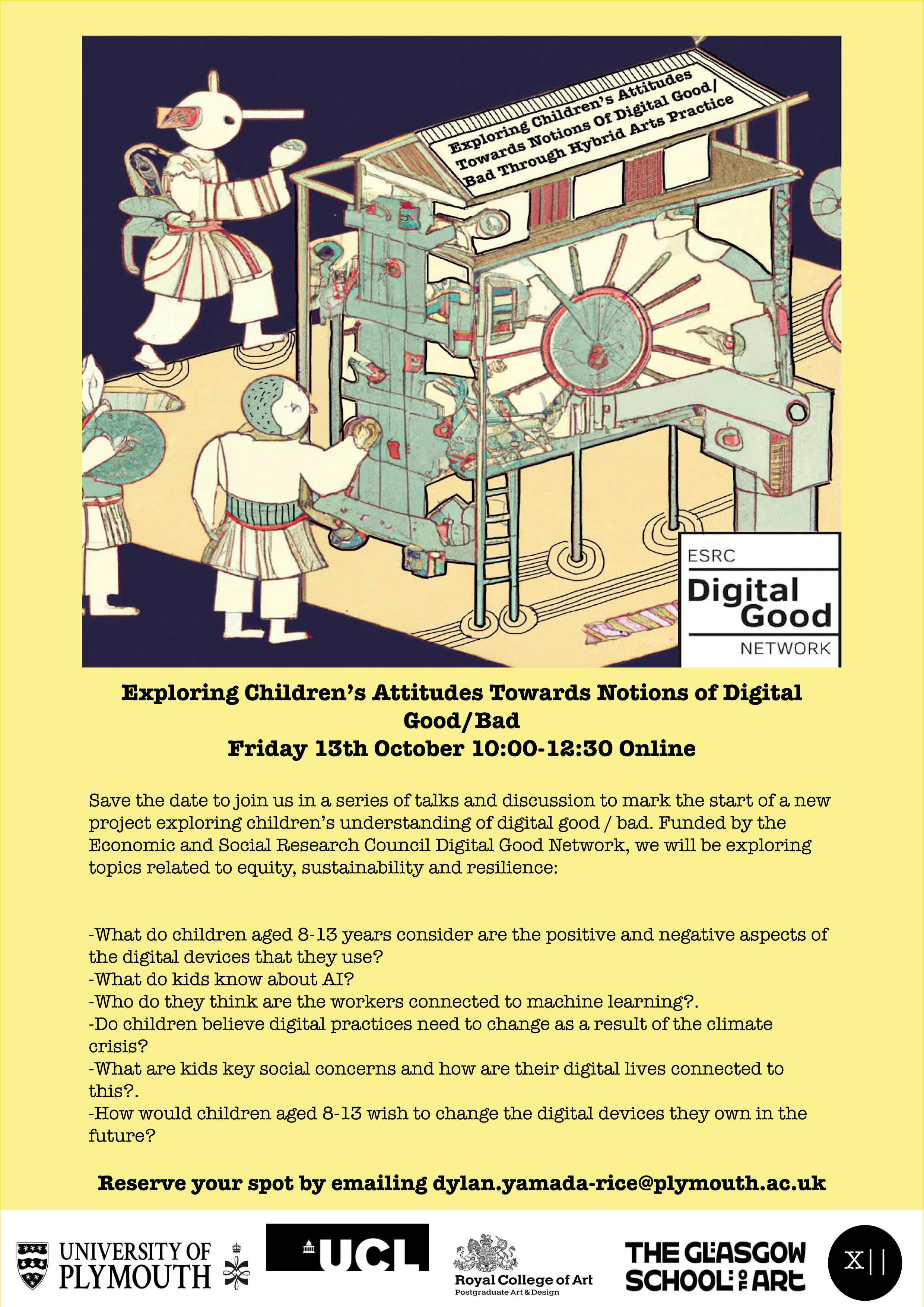
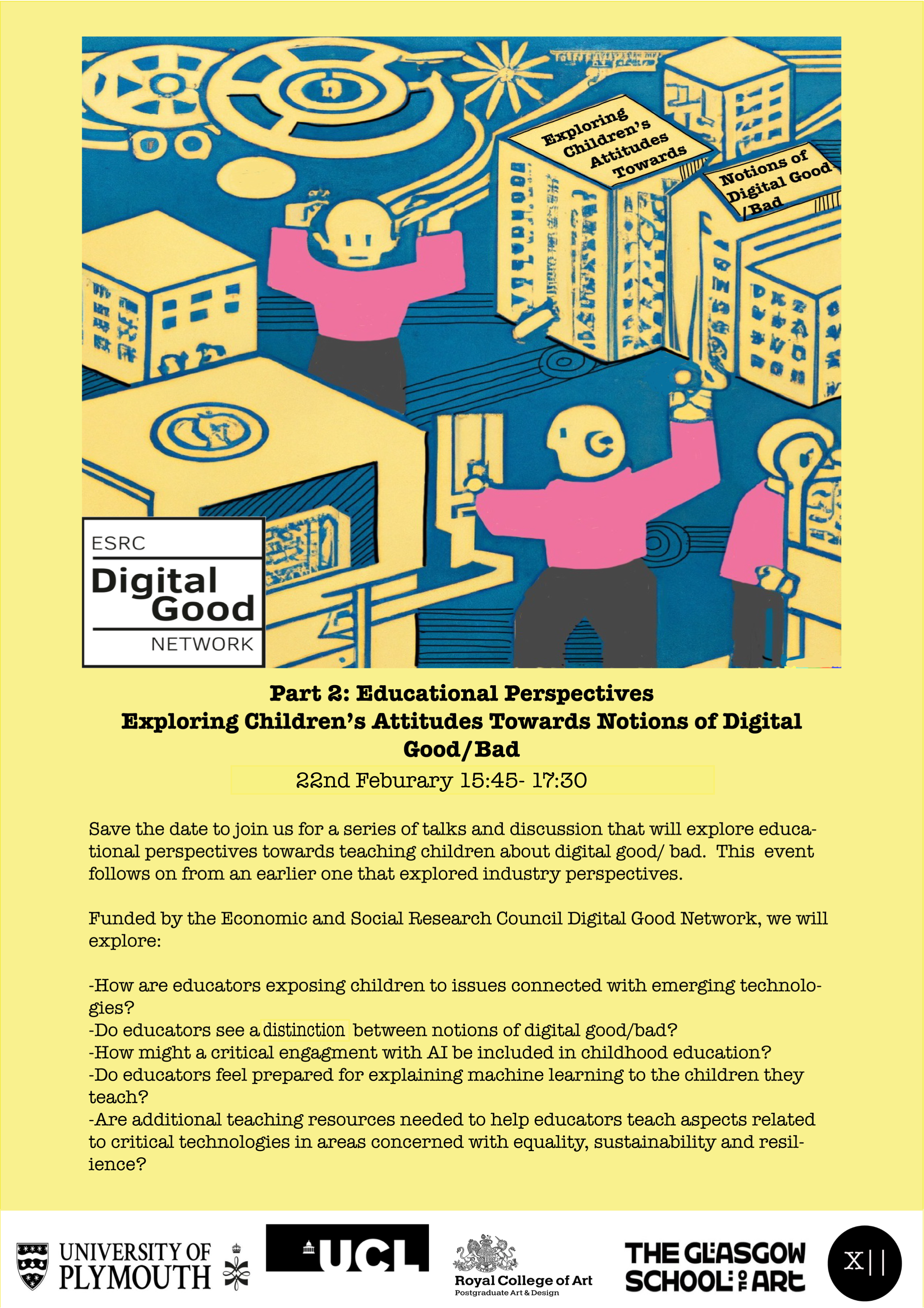
The networking event included talks from James Edward Marks (Founders of Playla.bz), Eleanor Dare (Co-Founder X||dinary Stories & University of Cambridge), Angus Main (RCA), Octavia Reeve (Ada Lovelace Institute), George Simms (Doctoral student, University of Plymouth, Thomas Lindtofte (University of Southern Denmark and myself.
Blog posts about the presentations from the networking event can be found here. Key themes that emerged from the presentations and related discussions included:
-
How can emerging technologies be inclusive?
- How can we teach children how technologies work?
- Tensions between protecting and empowering children
- Do children and adults view technologies in the same way?
- Do children feel technologies have been designed for them? If so, which ones?
- What do children understand by the term AI?
- What do children think is the climate impact of technologies?
- Who do children think is developing AI and why?
- How do children think AI works?
- How beneficial do children think certain technologies are?
- How can methodologies for work with children in this area also empower them?
- How do children want to be able to use AI?
- Do children think there is anything AI should not be used for?
- Do children know which companies are behind technologies?
- How do children feel technologies affect them (positively and negatively)?
- Do children think their parents have too many or not enough rules around their technology use?
- Do children feel they understand when images/videos have been altered by filters and/or AI?
- Do children think technologies contain bias? If so, which ones and in which ways?
(1) AI in Relation to Specific Technologies, (2) Who Decides Tech’s History (and Why?), (3) Tech and the Climate
Crisis, (4) Big Tech Objectives, (5) How Tech Works, (6) Would Children Design Tech Differently? and (7) Surveillance. These were then taken forward to create workshop materials to be used in the research with children (see next section).
Creating Workshop Material
We worked with the artist Richard Nash (Royal College of Art) who facilitated a scoping workshop with the full research team to combine the knowledge from our literature review and emerging themes from the networking events with the pedagogical techniques used in our Higher Education teaching of these topics, to explore how to adapt these for children, e.g. workshops to critique AI in digital art workflows and a digital theatrical performance that explored ethical issues connected to machine learning by comparing it to historic over whaling (MozFest, 2023).
We have previously worked with Richard on a collaborative zine that was used to facilitate additional findings from our UK-Japan location-based VR Network project in 2019.
Early ideas between the team focused on how to produce a series of prompts to be used for analogue and digital making which when combined could form a prototype activity book. Some of the examples of the visual prompts I made can be seen below and all of them can be found here.

Following this, a collaborative workshop with the research team was developed and led by Richard Nash to explore how our combined insights and ideas could be synthesised into materials and activities to work with children. Members of the research team were asked to create a blank A2 sheet-size zine to allow children to question their relationship to tech and share their knowledge about it. At the end of the workshop, the zines were shared amongst the researchers where reflections and further ideas were added through Post-it notes.
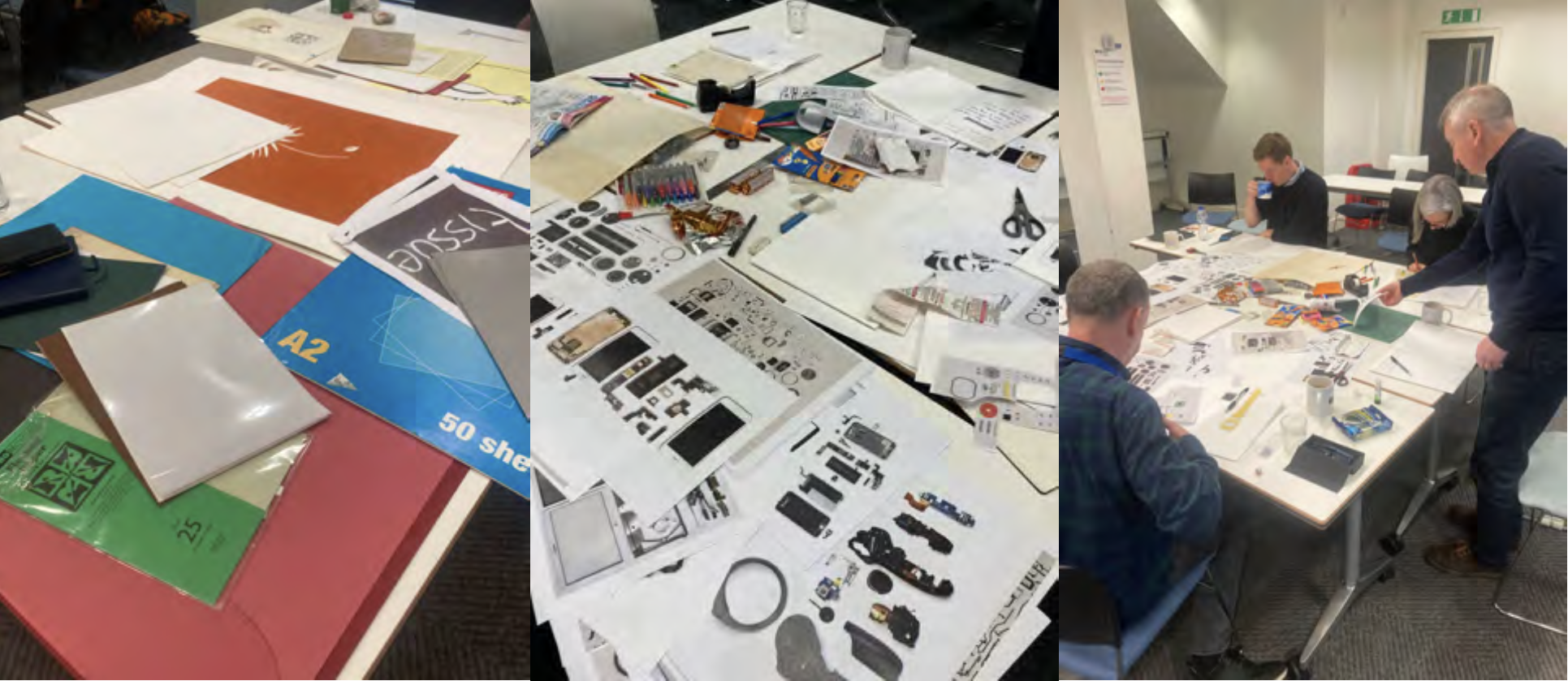 Images: Zine making workshop led by Richard Nash
Images: Zine making workshop led by Richard NashThis outputs from this workshop were combined with the earlier visual prompts and materials from the literature review and networking events and then used by Richard Nash to produce four zines that the team then used in the research workshops with children (see below). Each zine has a different focus on smart phones, smart devices, AI and game consoles.
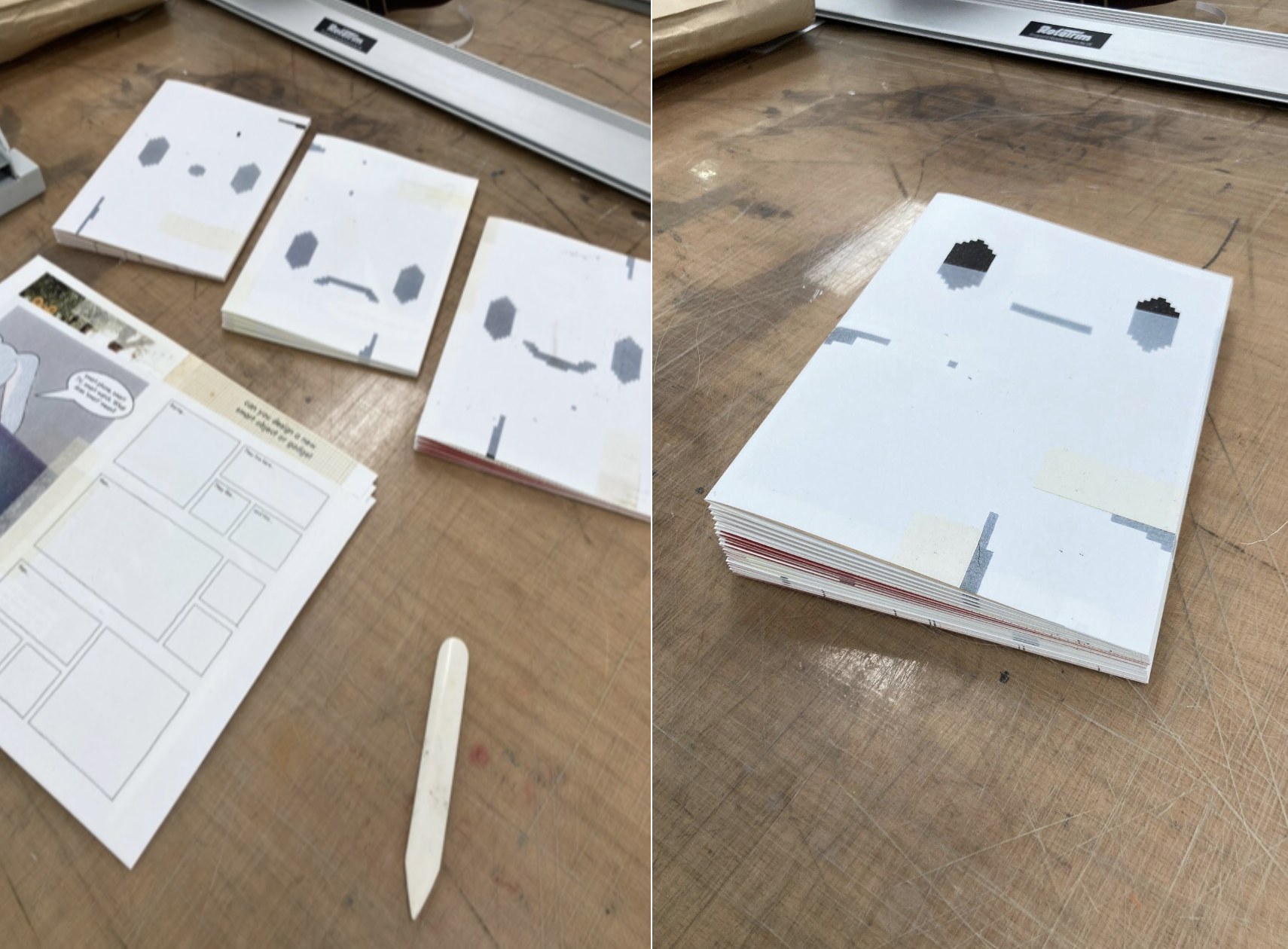 Images: Limited print run of completed zines (Nash, 2024)
Images: Limited print run of completed zines (Nash, 2024)Child-Friendly Project Information Sheet
As I have done with other projects, I drew an information sheet for children as part of the ethical approval process, believing that as researchers we have a duty to provide information in formats that suit the participants we want to work with.
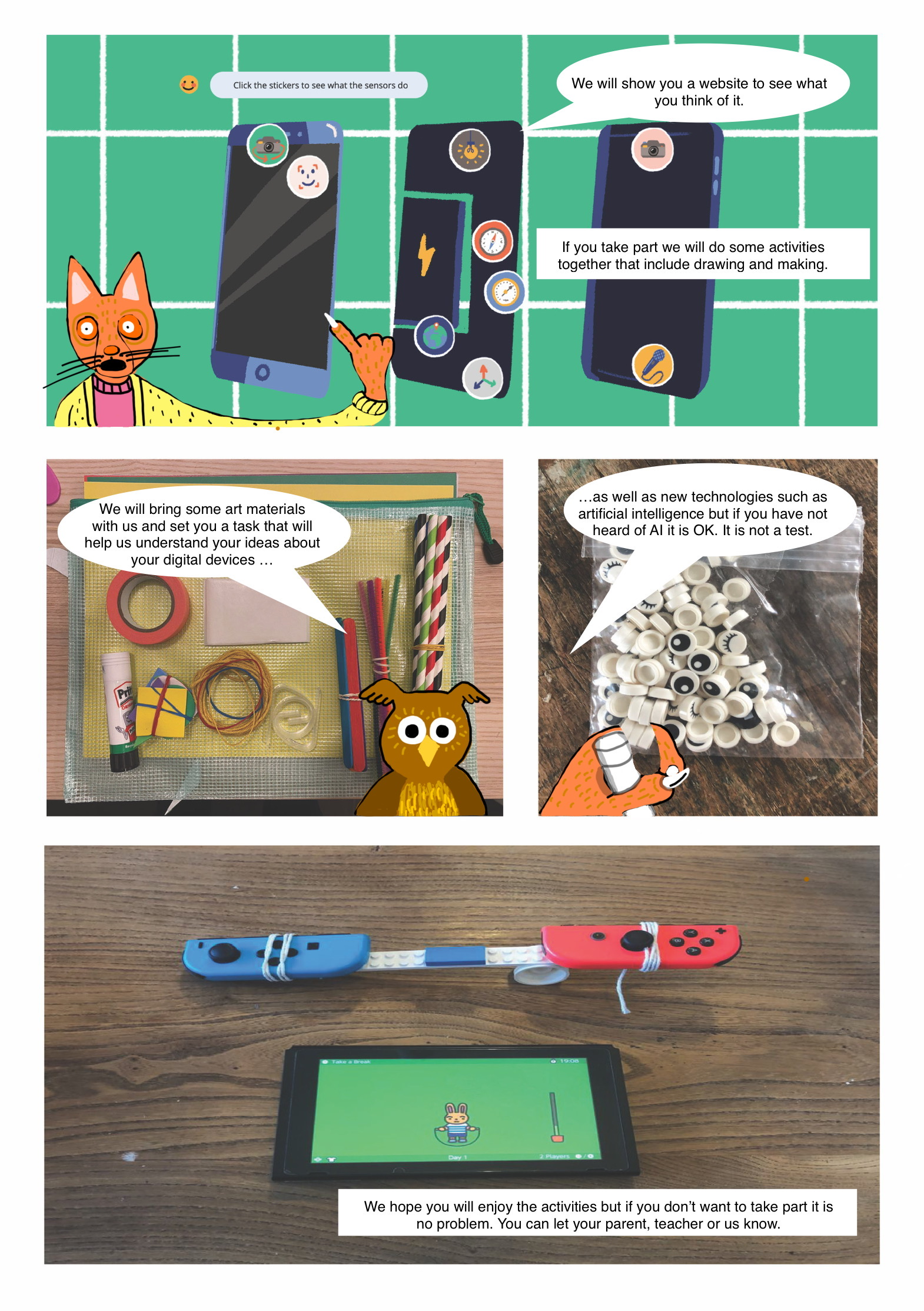
Participant Workshops
Workshops were held in Plymouth and London with children aged 8-12-years using workshop plans made to combine the zines with practical making using both analogue and digital materials. In the end we had time to undertake four actives: (1) materialising ideas about AI using blank masks, (2) redesigning smart phones using LEGO, (3) designing new forms of smart devices and (4) representing our digital selves as avatars made with Play-Doh. In terms of digital materials, children were shown how they could turn their physical creations into digital assets by using photogrammetry, a form of 3D model making using scanning.
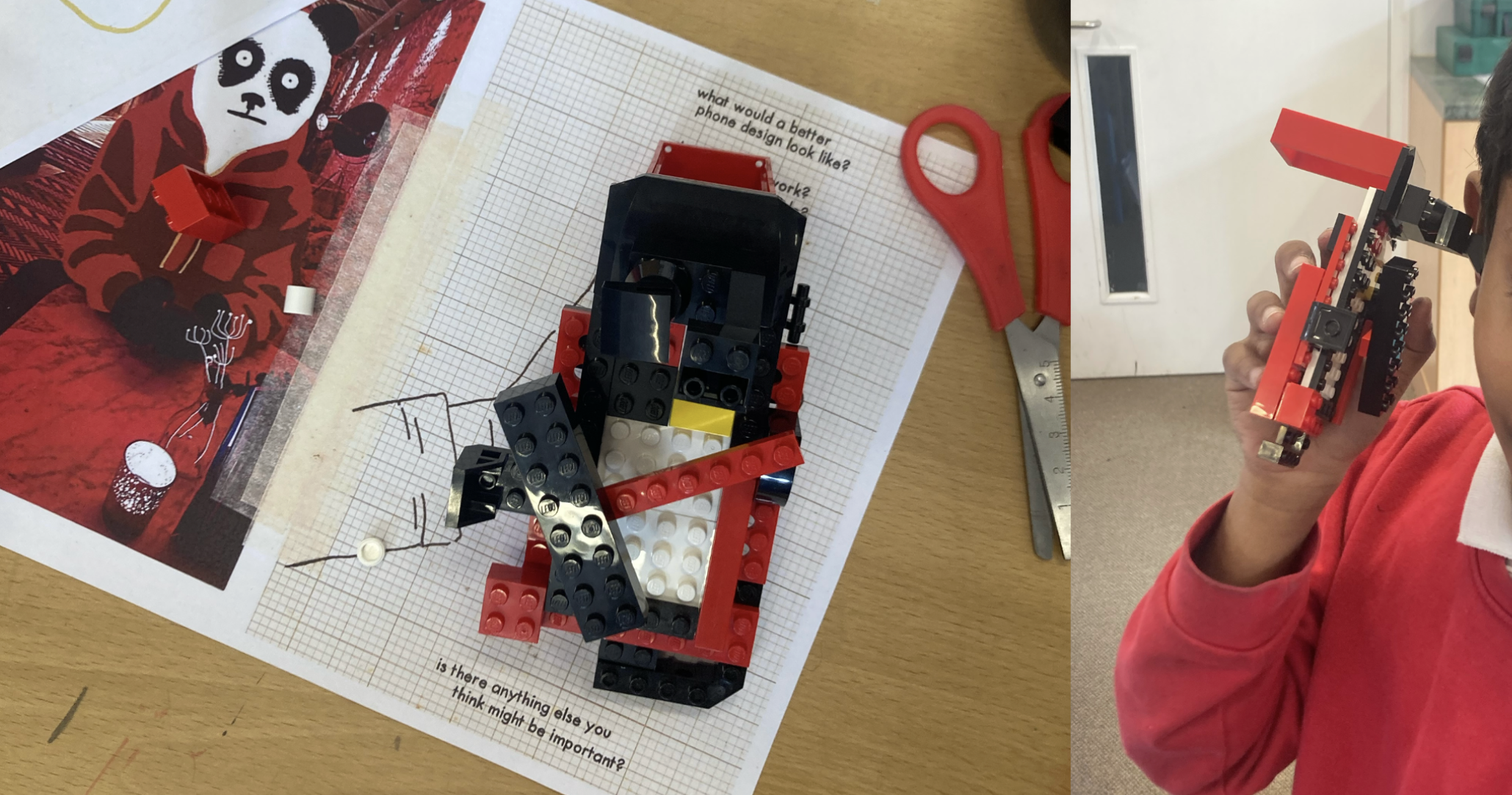
Images: Zine prompt with LEGO (Nash, 2024)
Findings
The findings from the project relate to (1) children’s critical engagement with tech, (2) children and AI (3) whether children would design tech differently, and (4) their ideas around tech and the climate crisis. Full findings can be found in the project report which can be downloaded here.
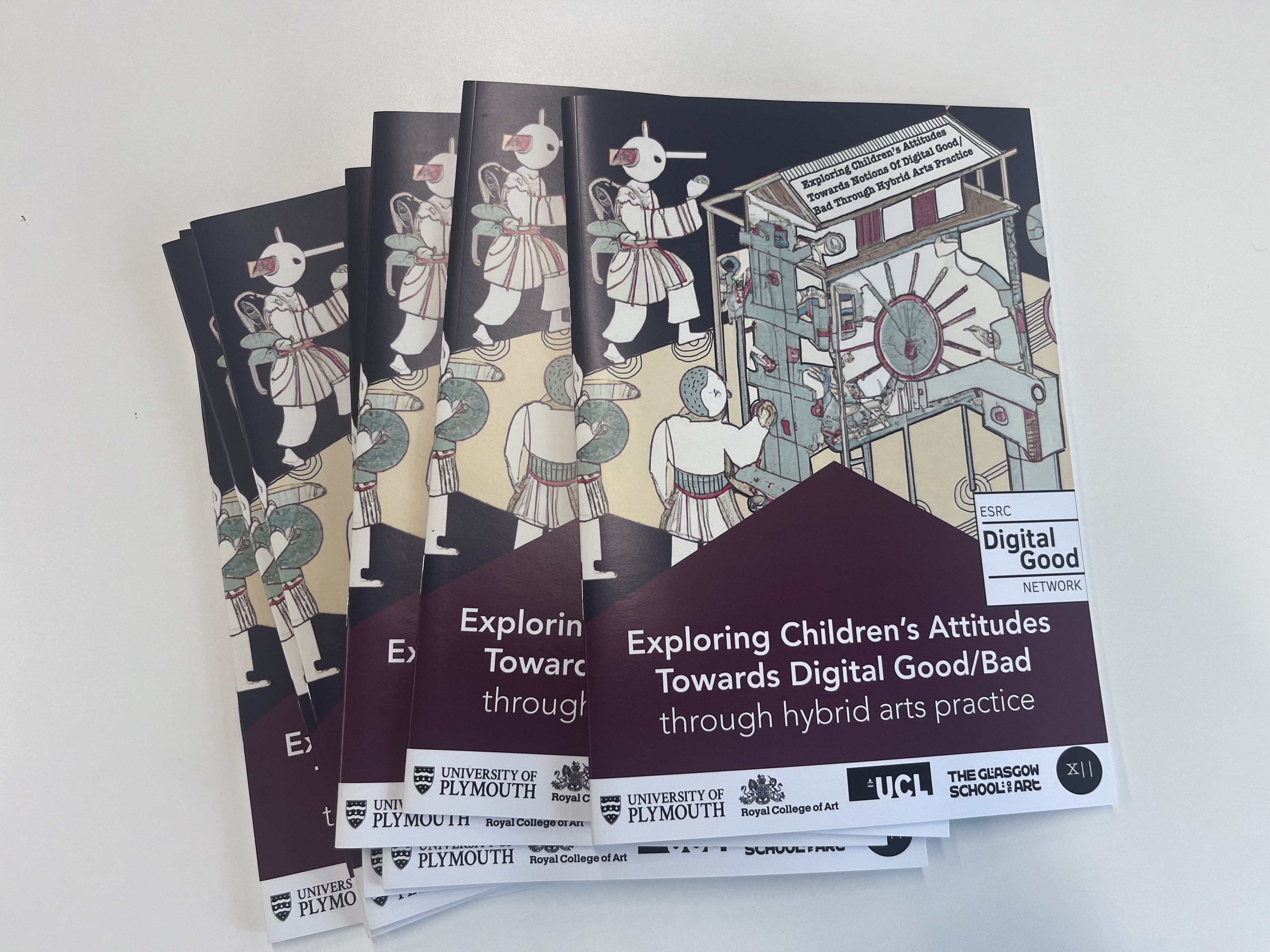
Talks & Publications
Yamada-Rice, D. (2025) An Experience Design Approach to Research, ESRC Digital Good Network Summer School, University of Sheffield, 25th June 2025.
Yamada-Rice, D. (2025) Children Attitudes Towards Notions of Digital Good Bad. Webinar Series: Digital Good in Progress, online, 21st May 2025.